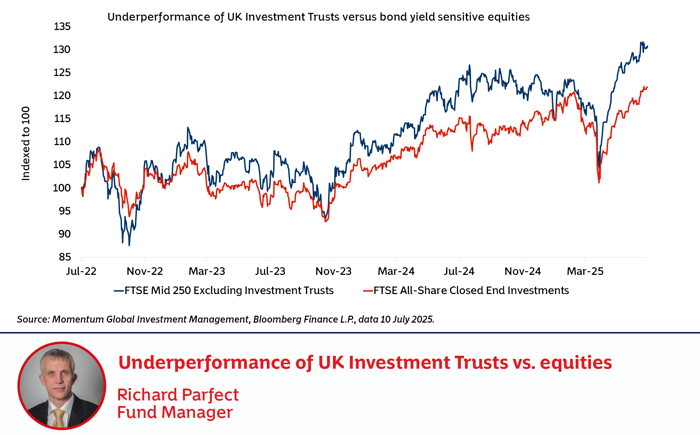
What this chart shows
This shows the 3-year performance of UK investment trusts versus the FTSE250 index excluding investment trusts.
As can be seen there is a marked underperformance over the period which closely aligns with some important events. Firstly, bond yields began to “normalise” in response to inflation, this is something that would ordinarily be expected to impact both equities, especially domestically focused ones such as UK midcap companies, as well as investment trusts invested in equities and real assets. Secondly, there was a change in the application of EU retained law that effectively made investments trusts appear significantly more expensive in terms of their cost to investors than they actually were. In effect, the internal expenses of running investment trusts, which are no different from the expenses of running a listed operating company, were reported as being additional deductions from investor’s investment. However, in reality such expenses had already been factored in and discounted by the share price. This triggered the steady exit of traditional sources of demand for such companies and hindered the ability of many investors to own the shares despite their resultant undervaluation.
Why this is important
Critics of the campaign to remove the mis-application of reported “costs” or more accurately termed “expenses” say that the fall in value of investment trusts are as much a result of other things such as higher bond yields. Such critics are not wrong in saying there are a variety of factors driving valuations and bond yields are one of them. However, higher and lower bond yields sink and raise all boats (respectively) and so we should not expect to see such a wide divergence of performance between the two sets of companies (UK mid cap companies and UK listed investment trusts).
More recently there have been signs of a recovery in investment trusts (from a low base) driven in no small part by increased merger and acquisition activity, some of which has come from opportunistic overseas investors who see assets trading well below fair value. It is very unfortunate that the investment trust sector has found itself in a situation where it has been hamstrung by a factor not of its making; a regulatory impasse, but one which is being worked on by the FCA and engaged members of the industry such as ourselves. This has been playing out whilst also having to contend with other matters such as the normalisation of interest rates and the economic cycle. We are hopeful that a solution can be found to the regulatory situation but in the meantime, compelling value is on offer to investors who can look past such factors. It is also why we launched our Momentum Real Assets Growth & Income Fund in April 2024 which is heavily focussed in this area.
Despite aggressive tariff threats from the US, global markets remained resilient, bolstered by record high stock indicies, robust AI sector inflows, strong earnings, and postponed tariff deadlines, highlighting investor confidence even as trade policy risks loom.

-
President Donald Trump unleashed his latest tariff ultimatum, declaring a 30% rate for Mexico and the European Union, as his trade agenda continues to keep allies off balance and inject uncertainty into global financial markets.
-
Resilient US labour data for June coupled with Senate passage of Trump’s reconciliation bill supported markets mid-week.
-
Central banks and other institutions accumulated about 77 tons of gold on average each month from January through to May, according to Goldman Sachs, which maintained forecasts for bullion to rally to fresh records in the coming quarters
-
Trump said he plans to make a “major statement” on Russia as the US readies more weapons for Ukraine. He also expects the Senate to pass a tougher Russia sanctions bill.

-
The Office for Budget Responsibility projected UK debt could soar to 270% of GDP by 2070, pushing up bond yields.
-
UK GDP shrank by 0.1% in May (second consecutive monthly decline), surprising markets on 11 July.
-
Marks & Spencer disclosed two major cyberattacks, costing ~£300 million, prompting calls for mandatory breach reporting.
-
Halifax reported that UK house prices were flat in June, however expectations of interest rate cuts later in the year could provide a boost to the housing market.

-
Germany (on behalf of the EU) warned it would retaliate against US tariffs if an unfair trade deal is reached.
-
President Trump declared a 30% rate for EU and Mexico, as his trade agenda continues to keep allies off balance and inject uncertainty into global financial markets.
-
ECB policy commentary hinted at easing while inflation moderated, and bond yields fell.
-
Western Europe had its hottest June on record as “extreme” temps blasted the region.

-
China and the US extended their 90 day tariff truces and advanced talks on rare earths and semiconductors. China’s rare earth exports jumped 32% in June from the prior month
-
China’s exports rose 5.8% last month, with growth accelerating for the first time since March on a reduction in US tariffs and robust demand from key overseas markets. Imports also rebounded 1.1%, following a 3.4% decline in the prior month.
-
Oil prices reached multi‑week highs (~$78–81 Brent) as OPEC+ supply cuts outweighed demand worries.
-
BRICS nations rebuked unilateral US tariff moves, as Trump threatened additional levies on aligned countries.
